Panamagate: Pakistan PM Nawaz Sharif quits after SC's disqualification
Nawaz Sharif quit as the Prime Minister of Pakistan, shortly after the Supreme Court's verdict disqualifying him

Beleaguered Pakistan Prime Minister Nawaz Sharif resigned on Friday after the Supreme Court, accusing him of dishonesty, disqualified him from holding the post following a probe that exposed illegal family wealth stashed abroad.
A five-judge bench unanimously disqualified Sharif from his post after an investigative panel linked his grown up children to offshore companies, showing that their wealth was far above their legitimate earnings. One of the judges, Ejaz Afzal Khan, said: "He (Sharif) is no more eligible to be an honest member of Parliament and he ceases to be holding the office of Prime Minister." Sharif's cabinet also stands dissolved.
Another elected PM 'sent home' in Pakistan: Maryam Nawaz
The much-awaited verdict in what came to be known as the Panama Papers case stunned the ruling Pakistan Muslim League-Nawaz, which put up a brave front saying all was not over for Sharif and he would remain its leader. But very soon the veteran politician, who was in his third term as Prime Minister, quit from office while claiming he had "strong reservations" about the Supreme Court ruling.
The Election Commission later issued a notification disqualifying Sharif as a member of the National Assembly.
The opposition was jubilant and celebrated on the streets. Many distributed sweets.
Chronology of Panama Papers scandal in Pakistan
The Panama Papers leaks of April 2016 revealed that three of Sharif's children owned offshore companies and assets not shown on his family's wealth statement. This was apparently used to channel funds to acquire foreign assets, including in London.
The court has recommended that anti-corruption cases should be registered against several individuals including Sharif, his daughter Maryam and her husband Mohammad Safdar, Sharif's sons Hassan and Hussain Nawaz as well as Finance Minister Ishaq Dar.
The bench also disqualified Dar and Safdar, an MP, from holding office.
The bench said the Prime Minister, who has denied any wrongdoing, had been dishonest to Parliament and the judiciary and could not be deemed fit to hold office.
Justice Ejaz Afzal Khan said all material collected by the Joint Investigation Team (JIT), which probed the allegations against Sharif and his family, would be sent to an accountability court within six weeks.
The President of Pakistan, Mamnoon Hussain, has been asked to take necessary measures to run the country after Sharif's disqualification.
It was the second time in Pakistan that the Supreme Court has disqualified a sitting Prime Minister. In 2012, Yousaf Raza Gilani was disqualified over contempt of court charges for refusing to reopen a corruption case against then President Asif Ali Zardari.
This is the third time Sharif has failed to complete his term in office. In 1993 he was sacked by the President over corruption allegations. And in 1999 he was ousted in a coup by Army Chief Pervez Musharraf.
Pakistan Tehreek-e-Insaf leader Imran Khan, who had emerged as the most vocal critic of Sharif, said that with his disqualification, the foundation of a new Pakistan had been laid.
Former President Musharraf, who went into virtual exile after Sharif returned to power, said the Supreme Court decision will have a positive impact on the country.
The Pakistan People's Party said it was regrettable Sharif didn't step down earlier and urged the authorities to ensure he didn't flee the country.
Sharif's daughter Maryam Nawaz was defiant. She tweeted: "Today will pave the way for Nawaz Sharif's resounding victory in 2018. He will be unstoppable. Rok sakte ho to rok lo!"
The ruling party, which said it will challenge the verdict, expressed reservations over the disqualification of Sharif and said the removal of the Prime Minister was not on the basis of Panama Papers.
"Since 1947 till date, not one Prime Minister of Pakistan has completed the five-year tenure. Call it irony of fate or mistakes on one ground or the other," said party leader Barrister Zafarullah.
It was unclear who will succeed Sharif till the 2018 general elections. Sharif had warned that his ouster would destabilize Pakistan.